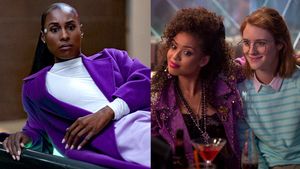This interview was conducted as part of the interview podcast, LGBTQ&A.
One of the most important films of the year is now streaming on Netflix. Directed by Sam Feder and narrated by Laverne Cox, Jen Richards, Susan Stryker, and Brian Michael Smith, to name a few, Disclosure takes you through the history of trans representation in Hollywood. Gender transgression has always existed on screen; the first portrayals date back to the early 1900s. In the overwhelming majority of the 400 films and 600 television shows Disclosure highlights, we see trans folks as punchlines, as people who cannot be trusted, and/or deserving of extreme acts of violence.
This is how the world, both cis and trans, has and continues to learn about the trans experience. Writer/actress Jen Richards articulates the injurious yet complicated nature of this, a sentiment repeated throughout the film: Yes, these portrayals forced her to internalize a "monstrous" view of what it means to be trans, but it was also taught her that trans people existed.
"Is representation necessary at any cost? Is horrible representation better than no representation?," director Sam Feder asks. "I love in Disclosure that you hear such conflicting responses to that. We don't have a choice. These things either do exist or they don't."
Feder talks about this complexity on the LGBTQ&A podcast this week and is also joined by Alex Schmider, one of Disclosure's Associate Producers and the Associate Director of Transgender Representation at GLAAD.
Read highlights below and click here to listen to the full interview.
Jeffrey Masters: Watching the movie, it really surprised me to see that trans representation on-screen goes back to the beginning of Hollywood. Did you know that going into this?
Sam Feder: I knew there were deep roots to the images we were seeing and the images I had grown up with. So it was very validating, actually, to see how far back it went and to know that we've been a site of fascination for storytelling.
JM: Not all of these characters identified as "trans" or fit into how we understand that word today. What guidelines did you make for yourself to decide what films and characters to include?
SF: The way I defined trans for this film was "a character that was transgressing gender expectations."
In a lot of cases, if you saw someone that you might think, "Oh, that's a crossdresser," or, "That's a drag queen," or if within the story, they were playing someone of the opposite gender -- opposite for lack of a better word -- then I found that to be a character that is transgressing gender expectations. Whether the audience is in on it or not, all those things are to be explored.
JM: And there's not just a list on Wikipedia. How did you find so many different examples?
SF: My God, I wish there were a list. Two documentaries that changed my life are The Celluloid Closetand Ethnic Notions. Celluloid Closet is about gay and lesbian representation in film and Ethnic Notions is about Black people's representation in film and Hollywood. Both of those are based on books. When I decided to make this film, I thought there'd be a book. So I looked and looked and looked and there was nothing.
Documenting history is so ethically precarious, so I did not want to do this on my own. I did not want to decide which films and television shows to tell, which history to highlight.
So, the first thing I did was interview 70 other trans people who've worked on one side of the camera or the other and ask people to share their memories of what they've seen over their lifetime and what they've heard about. From those interviews, I was able to create a database from which the primary document of the film was based on.
JM: It was crowdsourced in a way.
SF: Yeah, exactly. Deeply crowdsourced. I think at the end we have around 400 film titles and 600 television titles. There's so much missing and so many voices that need to be included. I can't wait to see what the next person does with this topic.
JM: One of the voices we hear from that stuck with me is Jen Richards. She says that seeing trans people on-screen forced her to internalize monstrous depictions of trans people, but at the same time, it showed her that being trans was possible.
SF: It's something I've wrestled with my entire career. Is representation necessary at any cost? Is horrible representation better than no representation? I think there's no answer. I think I love in Disclosure that you hear such conflicting responses to that. We don't have a choice. These things either do exist or they don't. I think it's really interesting to wrestle with the complexity and contradiction of that reality.
My earliest memories are talk shows and The Crying Game and Boys Don't Cry. Those are really my three touchstones. They all had the same effect of making me completely disidentify with trans people.
JM: In the documentary, we see the scale of misrepresentation. There is a cruelty to a lot of it, for example, in a popular movie like Ace Ventura. It's not just a distasteful joke, it's cruel.
SF: Yes, and there's still a lot of film and television that does this. This is not ancient history by any means. On one hand, people know exactly what they're doing and they don't care. They think it's funny. That is the goal and they know they will get laughs, and then some people don't know what they don't know.
I found it fascinating...a few months ago, Jim Carrey did an interview and he talked about how, of course, the film would be done differently if it was done now. Ace Ventura would definitely be done differently.
However, he always felt that people missed the point, that he was playing a caricature of a homophobic person. He said, "The whole point of my plunging my mouth with the toilet plunger was because I kissed a guy." I was like, "Wow, you didn't even realize that this character was a trans woman."
Zeke [Smith], in the film, talks about how it's deeply transphobic and can also be seen as deeply homophobic. But, Jim Carrey isn't even acknowledging that person was a trans woman. So it's like, "Wow." You don't even know what you don't know. So where do you go? Where do you start?
JM: You knew a lot going into this, but still, what surprised you making the film?
SF: When you see it all in one place, so many things happen. You're realizing how ridiculous it is, you're seeing it all in one context and it's held in this history by these brilliant, beautiful trans people. Somehow you can start to move past it. You can start to have a distance from it. That was surprising and exciting.
There's a story that Susan Stryker shares in the beginning of the film of how this film Judith of Bethulia has a character that is credited as a eunuch in the credits. There's this character in the film where, ostensibly, the first film cut was made. That centering of transness in film history, I thought it changed the way I felt about being trans, about being in the world, about history, and that was an incredible revelation.
JM: And every film class probably talks about that moment in film history without mentioning the character's gender.
SF: Right. We're there and it's not acknowledged because it's not centered. You're not looking for it. That's why Susan [Stryker] is so crucial to our history. It just goes back to, if you don't have a stake in these things, whether it's the telling or the teaching or the sharing of these stories, so much is lost.
Disclosure is now streaming on Netflix.
The full interview with Sam Feder is available on all podcast platforms. LGBTQ&A is produced by The Advocate magazine, in partnership with GLAAD.


















































































